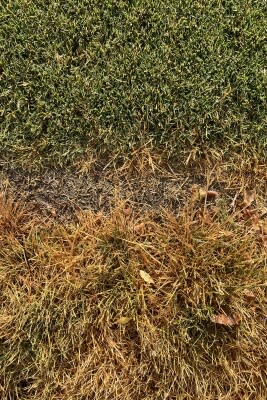SALT LAKE CITY (ABC4) — This week, Utah approved a type of grass that researchers say could help conserve water in the Mountain West, as it can live for weeks on end without irrigation amid scorching summer heat.
It’s called hybrid Bermudagrass. Up until this week, the grass was banned in Utah outside of Washington County, mostly because of its cousin, common Bermudagrass, which is an invasive, noxious weed.
READ NEXT: How hundreds of hungry cows are working to restore the Great Salt Lake’s shoreline
Researchers at Brigham Young University, Utah State University, and other organizations petitioned the state’s Noxious Weed Board to separate the two species. The board made the change on Monday.
“Our argument was that hybrid Bermudagrass is different, it’s not a noxious weed,” Bryan Hopkins, a BYU professor of plant and wildlife sciences, told ABC4.com. “They are two different animals, so to speak.”
For years, Hopkins has studied hybrid Bermudagrass as a possible option in Utah’s arid mountain climate, where local water districts offer rebates for homeowners to rip out their lawns as concerns abound over water scarcity and the future of the Great Salt Lake.
In his research, Hopkins found that hybrid Bermudagrass needs a fraction of the water compared to grasses traditionally grown in Utah, such as Kentucky Bluegrass. In recent studies, Hopkins and his colleagues would compare the two grasses, shutting off the water at test plots for up to six weeks.

The bluegrass quickly withered, but the hybrid grass didn’t show signs of stress until the end of the testing period, even amid Utah’s intense summer heat.
“Bottom line: using this type of grass in a lawn could reduce watering to only 2-3 times a season,” Hopkins said, in a news release.
Hybrid Bermudagrass is common in the American South, as it’s attractive and functional for both landscapes and sports fields. However, it does have roughly two months of less active growth, because it goes dormant from November to May in colder climates.
But climate change is making it so hybrid Bermudagrass increasingly makes more sense in the Beehive State, Hopkins said. He added that there’s an argument to be made that Kentucky Bluegrass “just doesn’t belong here” and won’t be the dominant grass in the future.
“We’ve had 100-degree temperatures this week, and [Kentucky Bluegrass] hates it,” Hopkins said. “You just have to pour the water on it to keep it from going dormant, and even then it sometimes still goes dormant.”
Ashley Beazer, a BYU grad student, said that while the hybrid grass has the potential to help communities across Utah save water, more research needs to be done to understand exactly how much less water the grass requires. The roots of hybrid Bermudagrass, she noted, can grow up to three feet deep.
“We’re definitely seeing that we can apply less water through our irrigation,” Beazer said, while adding that “it may be using water that we are not giving it.”
Copyright 2024 Nexstar Media, Inc. All rights reserved. This material may not be published, broadcast, rewritten, or redistributed.
For the latest news, weather, sports, and streaming video, head to ABC4 Utah.
Source Agencies

